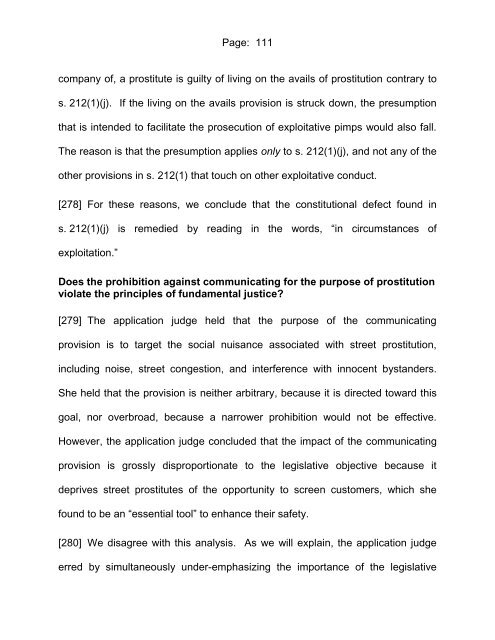Canada (Attorney General) v. Bedford, 2012 ONCA ... - York University
Canada (Attorney General) v. Bedford, 2012 ONCA ... - York University
Canada (Attorney General) v. Bedford, 2012 ONCA ... - York University
Create successful ePaper yourself
Turn your PDF publications into a flip-book with our unique Google optimized e-Paper software.
Page: 111company of, a prostitute is guilty of living on the avails of prostitution contrary tos. 212(1)(j). If the living on the avails provision is struck down, the presumptionthat is intended to facilitate the prosecution of exploitative pimps would also fall.The reason is that the presumption applies only to s. 212(1)(j), and not any of theother provisions in s. 212(1) that touch on other exploitative conduct.[278] For these reasons, we conclude that the constitutional defect found ins. 212(1)(j) is remedied by reading in the words, “in circumstances ofexploitation.”Does the prohibition against communicating for the purpose of prostitutionviolate the principles of fundamental justice?[279] The application judge held that the purpose of the communicatingprovision is to target the social nuisance associated with street prostitution,including noise, street congestion, and interference with innocent bystanders.She held that the provision is neither arbitrary, because it is directed toward thisgoal, nor overbroad, because a narrower prohibition would not be effective.However, the application judge concluded that the impact of the communicatingprovision is grossly disproportionate to the legislative objective because itdeprives street prostitutes of the opportunity to screen customers, which shefound to be an “essential tool” to enhance their safety.[280] We disagree with this analysis. As we will explain, the application judgeerred by simultaneously under-emphasizing the importance of the legislative
















